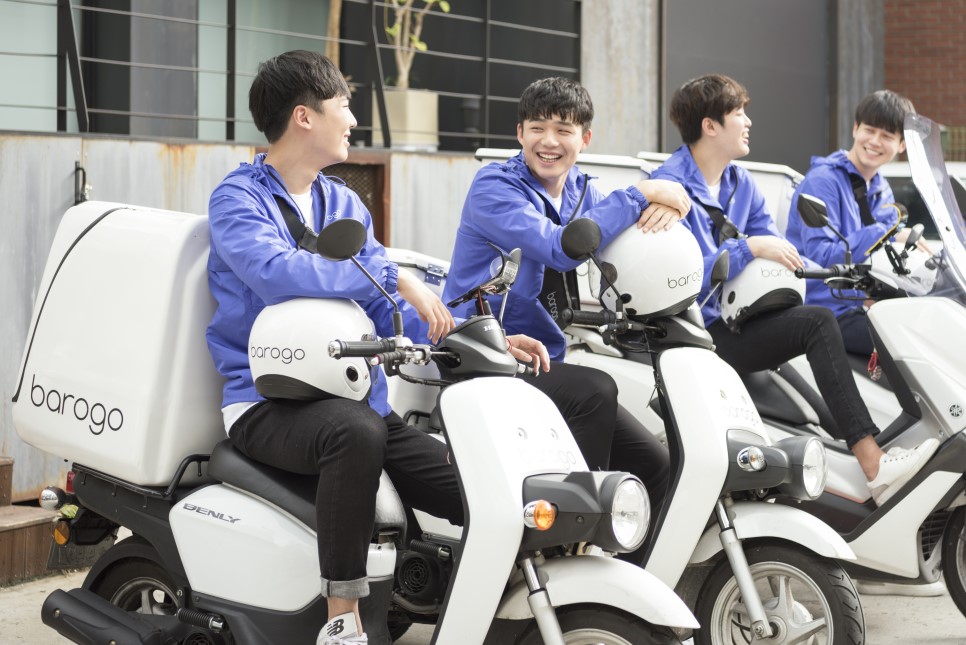Korean last-mile delivery apps’ valuations out of sync with demand surge
By Sep 10, 2020 (Gmt+09:00)
LG Chem to sell water filter business to Glenwood PE for $692 million


Kyobo Life poised to buy Japan’s SBI Group-owned savings bank


KT&G eyes overseas M&A after rejecting activist fund's offer


StockX in merger talks with Naver’s online reseller Kream


Mirae Asset to be named Korea Post’s core real estate fund operator


South Korea’s leading last-mile delivery startups have put their shares or management rights up for sale, riding on the surging demand for delivery of food and daily necessities. But they have been forced to cut valuations to lure investors.
In the absence of service differentiation, the high turnover rate of freelance motorcycle drivers for last-mile delivery companies – Barogo, Logiall and Vroong – overshadows their business outlook in a market with low entry barriers, said private equity industry sources.
Managing delivery drivers also runs the risk of labor disputes, under the current pro-labor government.
“Their business is all about gathering drivers” an investment banker told the Korean Investors. “But those drivers do not belong exclusively to one platform, thus the platforms are meaningless by themselves.”
Software developer Insung Data Co. Ltd., the operator of Logiall, has offered its management rights in the delivery platform this year. Founded in 2016, Logiall controls about 70% of South Korea’s last-mile delivery service market.
Insung recently slashed its valuation on Logiall by one-third to 200 billion won ($169 million) to attract investors.
Mesh Korea, which runs delivery app Vroong, had been in talks with retailer E-Mart Inc. and other potential investors earlier this year. But they walked away in the wake of the coronavirus outbreak. Mesh Korea reported operating losses in both 2018 and 2019.
E-Mart reportedly valued Vroong at between 250 billion and 350 billion won, below Mesh Korea’s initial valuation of 400 billion won for the platform.
Barogo received 7 billion won in investment from Korean venture capital firms, which valued the startup at 170 billion won, late last year. It is now looking for new investors.

Driven by the non-contact and stay-at-home trends, South Korea’s food delivery market has grown to 20 trillion won a year by value, according to the country’s anti-trust body. Delivery service providers enjoyed a broader user base from restaurants to fast food franchisees, including McDonald’s and Burger King, as well as convenience stores.
“But as the delivery market continue to boom, drivers tend to move to a rival platform that pays more, making it difficult to put a proper valuation on their business,” the investment banker added.
REPUTATION RISK
Basically, last-mile delivery service operators – Logiall, Barogo and Vroong – differ from food-ordering apps such as Baedal Minjok (Baemin), Yogiyo and Baedaltong. Two of the three ordering platforms are owned by Germany’s Delivery Hero, with its acquisition of Baemin pending approval from Korea's anti-trust body.
The delivery apps run delivery distribution networks and match orders received through the Baemin, Yogiyo and Baedaltong platforms with delivery drivers for a fee, although Baemin provides direct last-mile delivery service for a small portion of the market.
These last-mile delivery startups noted that they have collected big data on distribution networks to optimize their delivery routes. Optimized routes are likely to improve business efficiency and lead to a lower turnover rate of delivery workers.
Vroong directly manages delivery workers and pays delivery fees to them. Both Logiall and Barogo are run in partnerships with delivery drivers and receive commissions from them in return for matching orders.
But some investment bankers remain skeptical about their business model.
“After scrutinizing one of those companies, it suddenly hit me: What am I buying for this money?,” said a private equity fund source. “No matter what they have in tangible assets, it would be no surprise at all to see them replaced by new companies, say, in three months.”
Korean conglomerates have been outsourcing last-mile delivery services to avoid dispute with delivery workers. To secure a stable delivery network, they can just take a minority stake in a delivery platform and form a business partnership, the banker added.
South Korea’s No.1 internet portal Naver Corp. holds a 21% stake in Mesh Korea, the operator of Vroong, as the largest shareholder. With the delivery service launch for its online shopping business, Naver is considering investing in Logiall, but only for a minority stake, according to sources.
“In the US where the online-to-offline platform is common, delivery workers get used to working for a platform as independent contractors,” said a startup source. “But in Korea, those platforms are exposed to the labor dispute risk with the delivery workers. Given that, large business groups and retailers may not feel compelled to jump into the business, given the reputation risk.”
Write to Jun Ho Cha at chacha@hankyung.com
Yeonhee Kim edited this article
-
 Business & PoliticsTrump Jr. meets Korean business chiefs in back-to-back sessions
Business & PoliticsTrump Jr. meets Korean business chiefs in back-to-back sessionsApr 30, 2025 (Gmt+09:00)
-
 Korean chipmakersSamsung in talks to supply customized HBM4 to Nvidia, Broadcom, Google
Korean chipmakersSamsung in talks to supply customized HBM4 to Nvidia, Broadcom, GoogleApr 30, 2025 (Gmt+09:00)
-
 EnergyLS Cable breaks ground on $681 mn underwater cable plant in Chesapeake
EnergyLS Cable breaks ground on $681 mn underwater cable plant in ChesapeakeApr 29, 2025 (Gmt+09:00)
-
 Business & PoliticsUS tariffs add risk premium to dollar assets: Maurice Obstfeld
Business & PoliticsUS tariffs add risk premium to dollar assets: Maurice ObstfeldApr 29, 2025 (Gmt+09:00)
-



